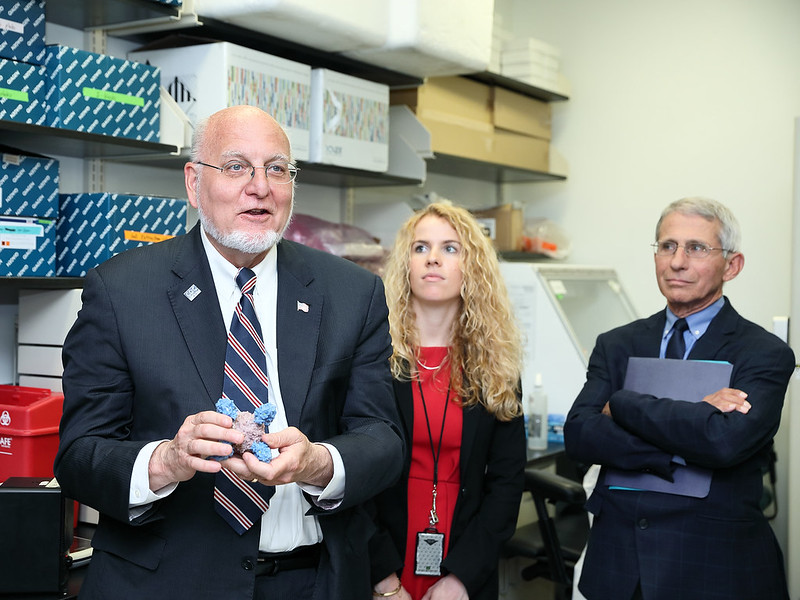House Oversight Committee Questions Government Response to Coronavirus
In a combative hearing, top federal health officials discussed existing efforts to constrain the coronavirus and warned Americans that extensive measures will be required to prevent further spread.

Published by The Lawfare Institute
in Cooperation With

The House Committee on Oversight and Reform convened a hearing on March 11 to discuss the government’s preparations and response to the novel coronavirus and the respiratory disease it causes, COVID-19. Top federal health officials discussed existing efforts to constrain the coronavirus and warned Americans that extensive measures will be required to prevent further spread.
In a hearing that often struck a combative tone, the Oversight Committee heard testimony from Anthony Fauci, director of the National Institute of Allergy and Infectious Diseases; Robert Redfield, director of the Centers for Disease Control and Prevention (CDC); Robert Kadlec, assistant secretary for preparedness and response at the Department of Health and Human Services; Terry M. Rauch, acting deputy assistant secretary of defense for health readiness policy and oversight at the Department of Defense; and Chris Currie, director of energy management and national preparedness of the Government Accountability Office.
Health officials warned lawmakers of the seriousness of the crisis. In response to questions from the committee chair, Rep. Carolyn Maloney, Fauci stated: “[B]ottom line, it’s going to get worse.” He noted that the flu has a mortality rate of 0.1% and that COVID-19 “has a mortality of ten times that.” Officials stressed that the magnitude of the outbreak would depend on the extent of public health efforts in the coming months. When asked by Rep. Glenn Grothman for an assessment of how many deaths he believed there would be in the United States, Fauci responded: “If we are complacent and do not do aggressive mitigation then the number could go way up and involve many, many millions.”
In his testimony, Fauci spoke about the role of the National Institutes of Health (NIH) in developing a vaccine and therapies to combat the novel coronavirus. Fauci stated that there are “probably at least ten” candidates for a vaccine at various stages of development and that the NIH plans to begin Phase I clinical trials on one of these candidates within the next four weeks. But he warned that a successful vaccine will likely take between 12 and 18 months to develop.
Committee members sparred over the Trump administration’s response to the coronavirus outbreak, with Democrats criticizing Trump for making misleading statements about the disease. Rep. Gerry Connolly charged that “[t]he President made patently false assertions—which Dr. Fauci correctly corrected—about the development of the virus. In fact, he was more concerned about what was happening on the stock market than he seemed to be concerned about American public health.” Rep. Stephen Lynch said that “the President on March 6 told the people of my district—publicly—that the tests were ready and that anybody who wants a test can go be tested.” Delays in developing tests have hindered the American response to the coronavirus. Only 75,000 tests have been released in the United States, according to testimony provided by Redfield.
Republicans hit back by defending the president’s response and accusing the Democrats of playing partisan politics. “I am incredibly disappointed in the politicization of this COVID-19 response,” said Rep. Mark Green. “The 24/7 criticism that the president is undergoing is unwarranted at a minimum.” Green argued that the administration had taken action only shortly after the novel coronavirus outbreak was first reported by Chinese officials in Wuhan.
Connolly responded sharply to Republican committee members, saying, “We didn’t politicize the fact that the global health and security biodefense desk and the [National Security Council] was dismantled by this administration two years ago.” He added, “We aren’t the ones who called the alarm that’s being raised about the pandemic as ‘fake news’. That came out of the President of the United States’ mouth.”
Fauci did not shy away from criticizing the Trump administration. When Connolly asked him about the 2018 elimination of the office within the National Security Council charged with global health and security, he responded: “I wouldn’t necessarily characterize it as a mistake. I would say we worked very well with that office. It would be very nice if the office was still there.”
Lawmakers also criticized the Trump administration for delays in manufacturing and distributing tests. Rep. Raja Krishnamoorthi highlighted that whereas South Korea had tested almost 4,000 people per million, the U.S. had tested only approximately 15 people per million. “South Korea can test more people in one day than we tested over the past two months,” said Maloney.
Rep. Jim Cooper asked whether the CDC planned to establish drive-through testing facilities in America—similar to those employed in South Korea—in order to prevent those infected with the virus from waiting in emergency rooms. Dr. Redfield said there were no plans to establish drive-through testing, stating that “we are trying to maintain the relationship between individuals and their healthcare providers.” Cooper then questioned whether “the professional monetary relationship comes before public health.” He added that “most Americans don’t really have a doctor. They rely on the ER to help.”
The witnesses cut short their testimony at the hearing in order to attend a meeting at the White House focused on the novel coronavirus. Rep. Maloney announced at the outset of the hearing that it would end an hour and a half early because President Trump had called an “emergency” meeting. “I don’t know what’s going on at the White House,” she said, adding that she had only been informed earlier that morning. “There seems to be a great deal of confusion and a lack of coordination at the White House. I hope this does not reflect on the broader response to this crisis.”


.jpg?sfvrsn=e915b36f_5)


